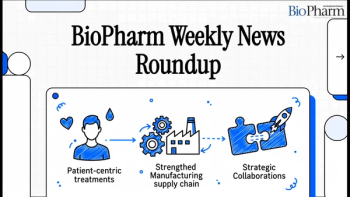
AI and innovative technology platforms are revolutionizing biopharma R&D and manufacturing, but success requires high data quality and next-gen solutions.
Feliza Mirasol is the science editor for BioPharm International.

AI and innovative technology platforms are revolutionizing biopharma R&D and manufacturing, but success requires high data quality and next-gen solutions.

Codexis and Nitto Denko Avecia aim to advance next-gen siRNA production methods for improving scalability of RNA therapeutics.

Digital platforms, automation, and new tech are driving efficiency, innovation, and advanced skill building in biomanufacturing, according to Sigma Mostafa of KBI Biopharma.

Biopharma innovators were recognized at CPHI 2025 for advances in drug delivery, continuous bioprocessing, and supply chain capabilities shaping global therapies.

Silvia Scaglione of React4Life explores how organ-on-chip systems, AI, and multi-organ models are revolutionizing preclinical testing and advancing personalized therapeutics.

Organ-on-chip platforms and AI integration are revolutionizing drug development, personalizing medicine, and advancing pharma research, says React4Life’s Silvia Scaglione.

Novartis’ acquisition accelerates RNA drug innovation, expanding genetic therapy pipelines and reshaping biomanufacturing strategies for neuromuscular disease.

News from the week emphasizes improvement of patient access and supply-chain resilience through AI-driven manufacturing and digital traceability.

Abzena’s antibody platform enables Orion to streamline biologics development, showcasing trends in scalable, risk-reduced manufacturing for the industry.

SK pharmteco expands US peptide production capacity, strengthening domestic API manufacturing and accelerating biopharma process development.

Non-parenteral alternatives for biologics remain a clinical imperative and a formidable challenge.


A new leadership summit and expert tracks explore AI, sustainability, and next-gen manufacturing shaping the future of global biopharmaceutical development.

This week’s news highlights biopharma R&D’s focus on new biologics and CGT innovation, with growth fueled by AI adoption and significant investments into market expansion.

ARM board member Miguel Forte highlights education programs, innovation hubs, and hands-on training to foster workforce expertise in the biopharma industry.

Maximizing value in advanced therapies requires the use of proven approaches, expert logistics, and tailored distribution, says Miguel Forte, board member of ARM.

Groundbreaking gene delivery, scalable IPSC approaches, and advanced production solutions will impact future CGT development, according to ARM board member, Miguel Forte.

ARM Board Member Miguel Forte highlights CGT investment shifts, sector resilience, and alternative funding strategies during Meeting on the Mesa.

Cellevate’s nanofiber technology enables higher viral vaccine titers in adherent cell cultures, advancing efficiency in large-scale biomanufacturing.

Scaling biopharma innovation demands advanced manufacturing, global market expansion, and solving patient access barriers.

Industry leaders at Meeting on the Mesa discussed big biopharma’s role in next-step CGT scale, focusing on manufacturing quality and patient access.

To increase CAR-T patient access, healthcare professionals must standardize high-quality delivery, shift to outpatient settings, and overcome current logistical barriers, industry leaders said at a session during the Cell and Gene Meeting on the Mesa.

In a session at the Cell and Gene Meeting on the Mesa, Prime Medicine CEO Allan Reine discussed how prime editing offers versatile, safe gene correction, but that delivery to target cells remains a major hurdle.

A panel at the Cell and Gene Meeting on the Mesa discussed how advanced therapy production demands modular platforms, automation, and data governance to drastically improve patient access and affordability.

In this week’s news, industry shifts are marked by new FDA draft guidances, Pfizer’s agreement to MFN pricing, Novartis’ launch of DTP distribution, and AI-driven protein design.

Naobios and Olon France create custom HCP ELISA to advance vaccine trials and strengthen global biopharmaceutical manufacturing capacity.

The regulatory progress for AAVantgarde’s AAVB-039 underscores advances in dual-vector gene therapy, as well as scalable manufacturing and efficient rare-disease clinical development.

The study by Integra Therapeutics and partners reveals how AI-engineered proteins could expand gene-editing tools and streamline development of advanced therapies.

This new draft guidance mandates efficient, long-term CGT postapproval monitoring using real-world evidence, registries, and decentralized models, all critical for biopharma.

This innovative trial guidance accelerates cell and gene therapy development for rare diseases, boosting biopharma efficiency and data maximization.